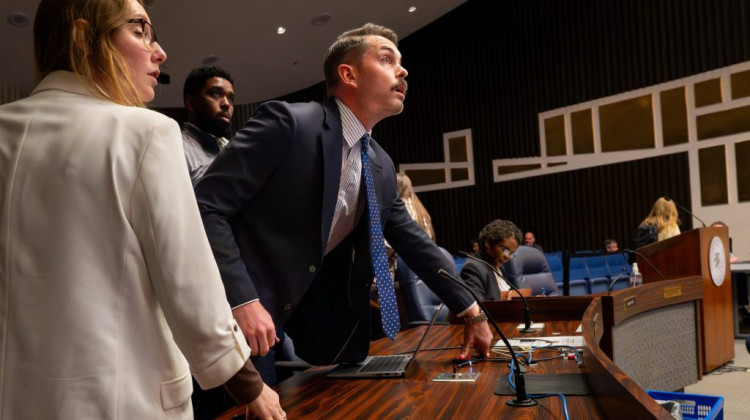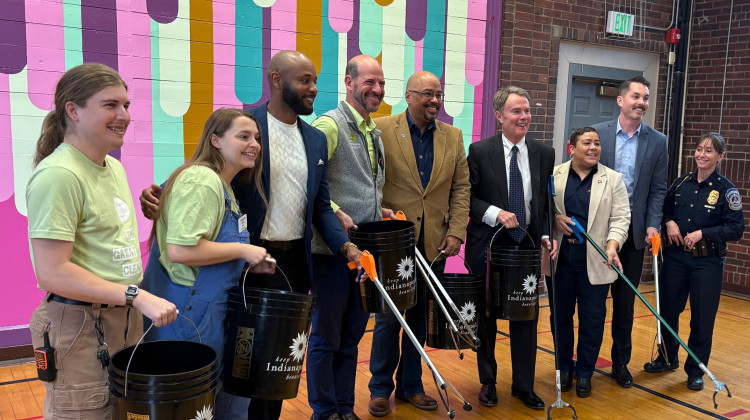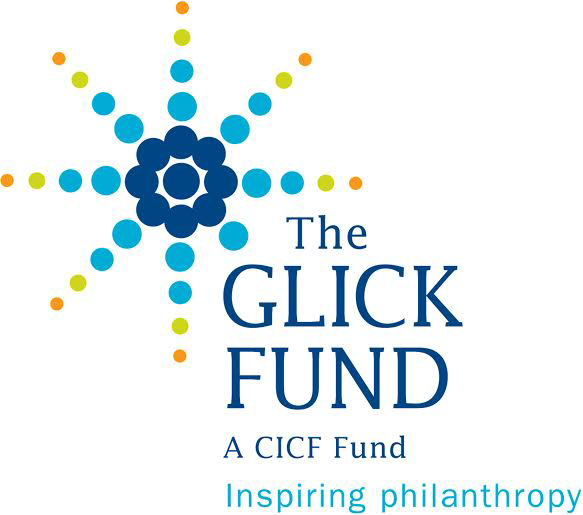
The group gave some statistics on crime in the area – notably that there were zero youth murders in the last year. But they didn’t have the prior year’s data for comparison. (Drew Daudelin/WFYI)
State Attorney General Curtis Hill joined leaders from the Indianapolis Ten Point Coalition on Friday to talk about a year-long anti-violence project in the city’s far east side. But the group downplayed any quantifiable results.
The Ten Point Coalition is a community group known for its street-level approach – volunteers often go on safety patrols in high-crime areas, where they engage with residents and aim to bring broken communities back together.
One year ago the attorney general announced his office would help Ten Point expand around the state, then said they would start with an area east of Indianapolis, near 42nd Street and Post Road.
During the Friday event the group gave some statistics on crime in the area – notably that there were no youth murders in the last year. But they did not have any prior year's data for comparison.
An IMPD official says he will work on getting those statistics. But Attorney General Hill says the group makes a difference in ways that don’t show up on a chart.
"I wanna caution everyone to not get so caught up in numbers," Hill says. "Because what it’s really about is, how do you feel? How do you feel when you break into the neighborhood, when you’re walking around, there’s a difference…there’s a difference when you have bullets flying and drugs being slung around in terms of how you approach the neighborhood."
When Mayor Joe Hogsett took office in 2016 his administration removed an established stream of city funding for Ten Point, a source the group relied on for years.
Ten Point President Rev. Charles Harrison says funding from the Attorney General's Office, which set aside a total of $500,000 for statewide expansions, helped make up for that loss. But he says support from the city is critical.
"The city needs to move away from a top-down strategy, where it's coming from the city and law enforcement," Harrison says. "It needs to be more of a bottom-up approach, where neighborhood associations and grassroots organizations are driving [the effort]."
Harrison says he sees it as a largely political issue, and blames Hogsett's group of advisors for the lack of support.
"Ten Point has been viewed as a Republican organization, with a bunch of black Democratic pastors," Harrison says, "and we haven't always gotten the kind of support from the Marion County Democrats that we should get."
Hogsett's administration removed city funds going straight to Ten Point when it shifted this kind of support to a grant-based program managed by an outside group. The office maintains the decision was about boosting transparency and removing conflicts of interest, not targeting Ten Point for failing to show results.
Since then, Ten Point has gotten a portion of that lost money through the grant program.
According to statistics Ten Point did provide for the far east side project, the group says it recruited 94 volunteers, made initial contact with 1,248 at-risk youth, and went on 168 safety patrols in the area throughout the year.
CORRECTION: A previous version of this story stated that Mayor Joe Hogsett's administration ended city funding for the Indianapolis Ten Point Coalition, in part, because of the group's lack of measurable results. The administration did end an established funding stream for Ten Point when Hogsett took office, but did so as it shifted this kind of support to a grant-based system managed by an outside group. The office maintains the decision was about boosting transparency and removing conflicts of interest, not targeting Ten Point or any specific group.
 DONATE
DONATE







 Support WFYI. We can't do it without you.
Support WFYI. We can't do it without you.